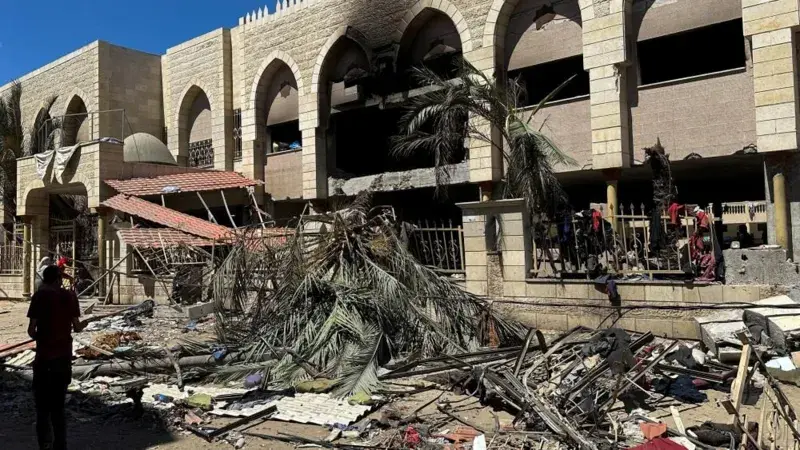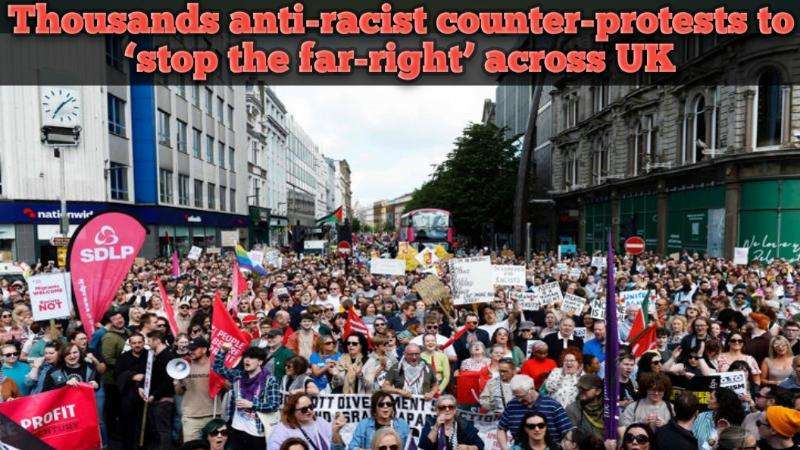More than 70 people have died as a result of an Israeli airstrike on a school in Gaza City that was housing displaced Palestinians, a hospital's director informed the BBC.
These were the fatalities who had been identified thus far, according to Fadl Naeem, head of al-Ahli Hospital, where a large number of the casualties were transported. Identification of the remains of many more victims proved challenging due to their severe disfigurement.
He declared that the circumstances were "catastrophic" and that the critically injured could not be treated by doctors.
A spokesman for the Israel Defense Forces (IDF) said al-Taba’een school "served as an active Hamas and Islamic Jihad military facility" with approximately 20 "militants" operating there. Hamas denies this.
Earlier estimates of the number of dead were also in the dozens, with the Hamas-run health ministry's ambulance service saying more than 60 had been killed, according to AP. The civil defence agency put the number at more than 90.
The BBC cannot independently verify figures from either side.
Israel has attacked several such shelters in Gaza in the past few weeks.
According to the United Nations, 477 out of 564 school buildings in Gaza had been directly hit or damaged as of 6 July, with at least another 14 targeted since.
Al-Taba’een school housed more 1,000 people - having recently received dozens of displaced people from the town of Beit Hanoun, after the Israeli army ordered them to leave their homes.
The building also served as a mosque and the Israeli strike hit during dawn prayers, witnesses said.
Jaafar Taha, a student who lives near the school, told the BBC the sound of the bombing was followed by screaming and noise.
"'Save us, save us', they were screaming," he said.
"The scene was horrific. There were body parts everywhere and blood covering the walls."
Salim Oweis, spokesman for the UN children's agency, Unicef, told the BBC the attack was "really outrageous".
"All those schools are really packed with civilians, children, mothers and families, who are taking refuge in any empty space whether it's a school or it's a mosque, whatever it is, even in hospital yards."
Israel's military said it had "precisely struck Hamas terrorists operating within a Hamas command and control centre embedded in the al-Taba'een school".
A statement by IDF spokesman Lt Col Nadav Shoshani said that "based on Israeli intelligence, approximately 20 Hamas and Islamic Jihad militants, including senior commanders, were operating from the compound struck at the al-Tabaeen school, using it to carry out terrorist attacks".
The Israeli spokesman said the casualty figures released by Hamas officials "do not align with the information held by the IDF, the precise munitions used, and the accuracy of the strike".
Hamas described the attack as a "horrific crime and a dangerous escalation" in Israel's "war of extermination against the Palestinian people".
Fatah, Hamas's political Palestinian rival in the Israeli-occupied West Bank, said Israel's aim was "to exterminate Palestinians through a policy of cumulative killing".
Philippe Lazzarini, head Unrwa, the UN agency which helps Palestinians, said "it’s time for these horrors unfolding under our watch to end".
The EU's foreign policy chief Josep Borrell said he was "horrified" by the images, adding: "There's no justification for these massacres."
The reported casualty figures for Saturday's early-morning attack are higher than in most such strikes.
But targeting school buildings has become a regular feature of IDF operations in recent weeks, apparently as part of what it says is an ongoing effort to destroy Hamas military infrastructure.
Since the beginning of July, more than a dozen schools have been hit, according to unofficial tallies, including at one point four in four days.
Each time, in nearly identical statements, the IDF says Hamas is hiding in the schools and using them as command centres to plan and carry out attacks, something Hamas denies.
Whatever the case, these buildings are where many displaced Gazans have sought shelter, and they are paying the highest price.
Many of the schools were run by the UN before the war, and the UN has strongly condemned the strikes.
It is not clear if this incident will impact struggling efforts to agree a ceasefire deal, which were set back by the assassination of the Hamas political leader Ismail Haniyeh in Iran.
But Egypt, one of the mediators involved in efforts to reach such a truce, said Israel’s “deliberate killing” of unarmed Palestinians showed that Israel lacked the political will to end the war.
Jordan said it was "an indication of the Israeli government’s efforts to obstruct and thwart these efforts".
Hamas-led gunmen killed about 1,200 people in an attack on Israel on 7 October, taking 251 others back to Gaza as hostages.
That attack triggered a massive Israeli military offensive on Gaza and the ongoing war.
More than 39,790 Palestinians have been killed in the Israeli campaign, according to Gaza's Hamas-run health ministry.








.svg)

